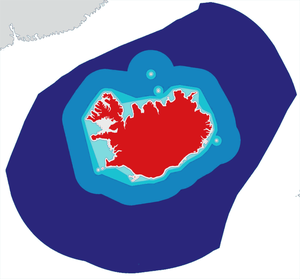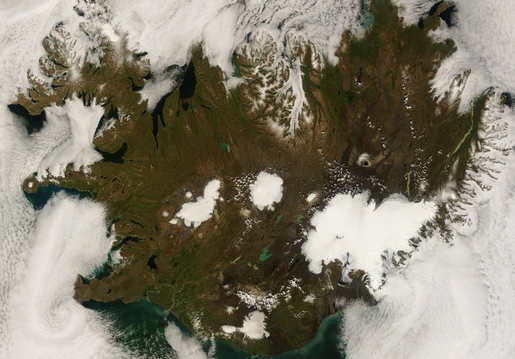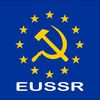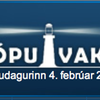Færsluflokkur: English, blogs in
This organization was set up by 15 people in the summer of 2011, and became a registered society on 12th of August, 2011. 'Fullveldi' (meaning sovereignty) is our blogsite's name (fullveldi.blog.is), or Fullveldisvaktin (the Sovereignty Watch).
In the Board of the Organization are the following: Jón Valur Jensson, chairman, Gústaf Skúlason, vice-chairman, Guðmundur Jónas Kristjánsson, cashier, and Halldór Björgvin Jóhannsson, secretary. Our social registration number (Icelandic: kennitala), in the "Fyrirtækjaskrá" (Register of firms and organizations) is 520811-1090. Our full (IBAN) bank account number, open for contributions from any Icelandic citizen, is IBAN IS95 0331 1330 1183 5208 1110 90. Our email no. is: fullveldiislands@yahoo.com and the chairman's telephone no. from abroad: -354 [for Iceland] 616 9070.
 Our emblem, or logo, on this website represents Iceland with its EEZ (Exclusive Economic Zone) as it has been from the first half of the 20th Cent.: 3 miles, then 4 miles from 1950/52, then 12 miles from 1958, 50 miles from 1972, and 200 miles (dark blue) from 1975, and finally secured after our victory in the 'Cod wars' with Great Britain. The 200 miles only apply where there is no medium line between Iceland and other countries, that is: Greenland (top left, in light-grey), and the Faroe Islands, some 280 nautical miles SE off Iceland.
Our emblem, or logo, on this website represents Iceland with its EEZ (Exclusive Economic Zone) as it has been from the first half of the 20th Cent.: 3 miles, then 4 miles from 1950/52, then 12 miles from 1958, 50 miles from 1972, and 200 miles (dark blue) from 1975, and finally secured after our victory in the 'Cod wars' with Great Britain. The 200 miles only apply where there is no medium line between Iceland and other countries, that is: Greenland (top left, in light-grey), and the Faroe Islands, some 280 nautical miles SE off Iceland.
Fisheries constitute the main source of income of Iceland's export. In 2005, Iceland was at the top of the sovereign states having the most income per capita in the world from fisheries. Denmark was third, with 240 US dollars per capita, and Norway second, with 835 US$ (and other states by far lower), whereas Iceland was leading all others with 3,642 US dollars income from fisheries per capita of the whole population in that year.
With an annual catch of around 1.3 million tons, and in some past years up to two million tons, Iceland's fisheries are the envy of the fishing industries of Europe. Spanish ministers of state, for example, have already deliberated about acquiring fishery rights for their fishing industry here in consequence of what they hope and expect: Iceland's accession to the European Union. Yet precisely the prospect of that accession is directly opposed by the vast majority of Icelanders themselves, according to all opinion polls since 2009.
This, however, is what the European Union is intent on turning 180° to its own advantage. For many years now leading individuals in the administration, politicians, representatives in the communes, bureaucrats, employers and trade unionists alike, as well as academicians, and people from the cultural sectors, have been invited on free luxury trips to Brusselles and Strasbourg, to become "better" informed on the EU; moreover, the embassy of the EU in Reykjavik is already in breach of Icelandic law and the Vienna diplomatic agreement by assigning 230 million Icelandic krónur (almost 2 million US$) for direct propaganda projects in Iceland, starting with last year; and on top of this there are the more than 20 times larger so-called IPA contributions, unconstitutionally exempting the EU from taxes and customs in Iceland, and by many seen as bribery money to 'convince' Icelandic recipients of the excellence of that Brusselles utopian federal state; their direct purpose is yet to adapt Icelandic society into the overall EU framework, and those contributions will not continue after the possible accession of Iceland into the EU.
In the North-East EEZ of this country there are now clear signs of some oil and gas being under the seabed, possibly also in NE regions of the Icelandic mainland, as well as off the west coast. Iceland is also very rich in geothermal water which has been used for heating homes here since early 20th Cent., and by now also used for producing electric power to no small degree, although most of those underlying resources are unused as yet.
Aluminum plants, owned by foreign corporations, make for a considerable part of Iceland's exports (although there are some minuses, as their imported raw material, and profits paid to foreign shareholders); those factories are using low-price electricity from our hydro-power stations.
The British and the EU are already avidly making plans to receive electricity from this country in a sea-cable to the British Isles (cf. here) and even to the continental mainland. This would, however, owing to EU supervision and 'equality rules', which would apply here, if Iceland would be acquired by the Brusselles super-power as a 'member state', be detrimental to Icelandic homes which enjoy, as yet, much more advantageous energy prices than the British.
Iceland's wild and beautiful nature also attracts a great number of tourists every year. The up to 40% devaluation of our national currency, the króna, after the bank crash in 2008, makes it even more economic for tourists now to visit Iceland. 
Jón Valur Jensson.
English, blogs in | Breytt 8.7.2012 kl. 13:58 | Slóð | Facebook | Athugasemdir (0)



 jonvalurjensson
jonvalurjensson
 zumann
zumann
 halldojo
halldojo
 gunnlauguri
gunnlauguri
 maeglika
maeglika
 bassinn
bassinn
 ragnhildurkolka
ragnhildurkolka
 asthildurcesil
asthildurcesil
 benediktae
benediktae
 bjarnihardar
bjarnihardar
 westurfari
westurfari
 alyfat
alyfat
 eggertg
eggertg
 einarbb
einarbb
 ea
ea
 vidhorf
vidhorf
 bofs
bofs
 falconer
falconer
 gmaria
gmaria
 alit
alit
 noldrarinn
noldrarinn
 tilveran-i-esb
tilveran-i-esb
 gustaf
gustaf
 diva73
diva73
 hjorleifurg
hjorleifurg
 jaj
jaj
 fiski
fiski
 islandsfengur
islandsfengur
 ksh
ksh
 krist
krist
 pallvil
pallvil
 rosaadalsteinsdottir
rosaadalsteinsdottir
 samstada-thjodar
samstada-thjodar
 viggojorgens
viggojorgens
 postdoc
postdoc
 vinstrivaktin
vinstrivaktin
 thjodarheidur
thjodarheidur
 ornagir
ornagir
 axelaxelsson
axelaxelsson
 diddmundur
diddmundur
 egill
egill
 bjartsynisflokkurinn
bjartsynisflokkurinn
 sunna2
sunna2
 esbogalmannahagur
esbogalmannahagur
 gudjonelias
gudjonelias
 gudjul
gudjul
 hreinn23
hreinn23
 coke
coke
 gustafskulason
gustafskulason
 heimssyn
heimssyn
 kliddi
kliddi
 thjodfylking
thjodfylking
 johanneliasson
johanneliasson
 jonbjarnason
jonbjarnason
 prakkarinn
prakkarinn
 jvj
jvj
 kristjan9
kristjan9
 lifsrettur
lifsrettur
 maggiraggi
maggiraggi
 predikarinn
predikarinn
 ragnargeir
ragnargeir
 undirborginni
undirborginni
 seinars
seinars
 thflug
thflug
 skolli
skolli
 doddidoddi
doddidoddi





